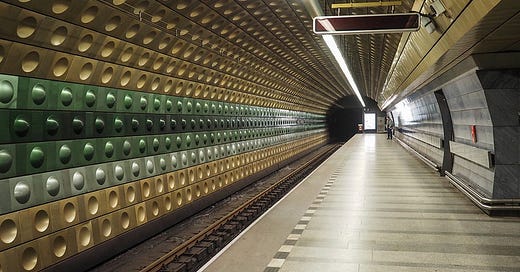Woke up about eleven after a bad night. Had breakfast. Read some of Burgess’ Earthly Powers which is very enjoyable. Had lunch, which was similar to breakfast. Tried doing some novel work. Shaved. Had tea with Barbora, left for work at 3:15. That was my first mistake.
The first lesson, for which I arrived only five minutes early, was terrible. I lost the class totally due to appearing incompetent. Due to being incompetent. I couldn’t conjugate a verb. Didn’t really recover until the third lesson. The second I only saved at the end by joking how boring it was. Damage limitation. The fourth class was funny. By that time you’ve accumulated all the jokes, worked out the problems, found the typos, etc. Felt awful by the end.
Made lots of self-accusations on the metro platform afterwards. But I have now made some mistakes to learn by1.
Had a meal, silently, in the Restaurant near the flat in Augustinova. Came back to find Barbora had half-prepared a meal. She’s at a film at the moment, with Ezra, or another man? Perhaps not even at a film. I have spent the evening reading through the textbook, thinking about tomorrow’s lesson. I will see Milena tomorrow morning and discuss my mistakes.
Notables. In the restaurant at which I had the meal, steak and marginal vegetables, there was a tape. The first song was ‘My old man’s a dustman’2 and the rest were post-modern Country songs, that is country songs about writing country songs about Country Folk. Who write country songs3.
Also Jitka and Jan were having an argument upstairs whilst I was having a bath, the dialogue was coming through the plughole, down the pipes, as clear as a radio soap opera.
Once you’ve lost a class, especially one made up of adults, it’s very difficult to get them back.
As he eats his Tatarský Biftek se Zeleninou (Steak Tartar with Mixed Vegetables), and listens to Czech Country Music, Young-Toby is facing the fear that he might not be up to the gig he’s been brought here to do. And he’s had the very hard shock that he can’t busk it.
Teaching, like writing, always requires full physical and mental commitment. It’s not always a battle but it is usually a struggle. You can’t go in unprepared or muddled.
One thing Young-Toby learns is that, for the Czechs, in the Czech language, there is no distinction between learn and teach. They are the same verb, učit.
This is a little like someone in English saying, That’ll learn ya.
Conceptually, as a linguistic rewiring, it’s useful. What happens in the classroom is all one thing, connected from end to end. The learning is the teaching is the learning.
It’s not a surprise that young-Toby failed like this. Teacher training often takes a year. He’s had perhaps twelve hours over four or five days.
In my memory, I was a pretty good teacher, right from the start. I was able to hold the class’s attention, and make them laugh if things got sticky. Rereading the diary has been a good correction to this vanity.
Perhaps Country Beat featuring Nad’a Urbánková’s hit version from 1973, in which the old man is a baker, and the title translates as ‘William bakes buns’.
Young-Toby starts to pick out recordable details. That’s why I think this Diary might have some social interest.
However, he somehow misses that today the Soviet Union beat Czechoslovakia 4-1 in the Men’s Ice Hockey World Championships. The Soviets, still called that, will go on to win the entire competition, after beating Czechoslovakia a second time, 5-0.
Ice Hockey is very important in Czech-Soviet relations. Young-Toby hears that, after one match that the Czechoslovak team won, in 1969, soon after the invasion, there was almost an uprising. Large crowds gathered. The windows of the Aeroflot offices in central Praha were smashed.
That’s what I remember being told.
Wikipedia confirms this as the Czechoslovak Hockey Riots, which caused a change in how the country was governed —
The protests were suppressed by the Czechoslovak military and police, now under full control of the hardliners from the Communist Party. The events were used as a pretext to oust the remaining leaders of the Prague Spring. Among them, Alexander Dubček was forced to resign as First Secretary of the Communist Party of Czechoslovakia, to be replaced by Gustáv Husák who started the politics of “normalisation”.
During the years of normalization, citizens of Czechoslovakia saw hockey games against Soviet Union as a quiet, symbolic way to protest. Police forces were regularly set on alert but never used.



